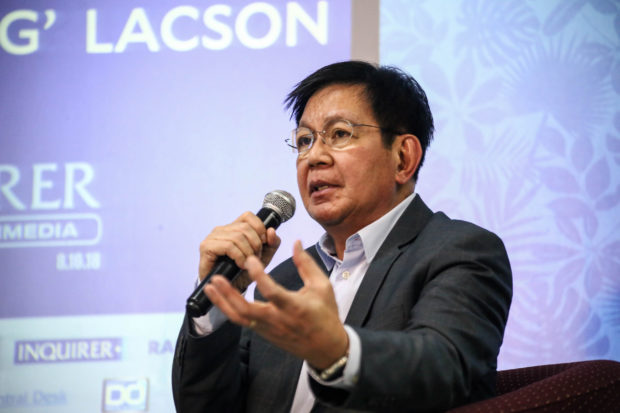Ping: P16B for LGUs smells like pork, too
Is this yet more pork in the 2019 budget bill?
The House of Representatives more than doubled the allocation for assistance to local government units (Algu) to P16 billion in the proposed budget for 2019, which Sen. Panfilo “Ping” Lacson questioned as it was done without consultation with the Department of Budget and Management (DBM).
“How would that be implemented if there had been no consultation with the executive?” Lacson said.
He also raised the concern that lawmakers would be behind the distribution of the additional funds after finding no details of where these would go.
Lacson considered the Algu allocation lump-sum funds.
Article continues after this advertisementDiscretionary
Article continues after this advertisement“Had we at least had a list of the disadvantaged municipalities, or barangays or provinces that would get this, I would not have said anything. But there’s none. It’s just a menu. So this is arbitrary, this is discretionary,” he said during interpellation on the budget.
Lacson said congressmen would just have a resolution made and then give away the funds.
The Algu fund was allocated P7 billion in the national expenditure program (NEP) that the DBM submitted to the House.
But in the House-approved general appropriations bill (GAB) now being scrutinized by the Senate, it rose to P16.08 billion.
DILG to implement Algu
The Algu fund is under the DBM, but the Department of the Interior and Local Government (DILG) will monitor and implement it.
Upon questioning by Lacson, the Senate finance committee chair, Sen. Loren Legarda, said the DBM was not consulted when the fund was increased to P16 billion.
“The increase from the NEP to the GAB was not based on consultation with DBM, at least. Whether there was consultation with local governments, that would be for the House to say,” Legarda said.
List of towns, cities
She also said there was a detailed list of municipalities and cities that would receive assistance from the fund, but this only amounted to P7 billion as proposed under the NEP.
Lacson said he had no problem with the P7 billion, as he presumed the projects under it were studied by the DBM. But he said he had questions about the P9 billion added by the House.
He said he planned to introduce an amendment to revert the fund to P7 billion as originally proposed.
During the deliberations, Lacson asked if the extra P9 billion in the Algu fund would constitute grave abuse of discretion. “If the DBM was not consulted, who would implement [it]?” he said.
Lawmakers would then have a hand in implementing the projects under the Algu fund, he warned.
The DBM could not monitor something it does not know about, he further said.
Legarda’s defense
Legarda said Algu was not a lump-sum amount and only local governments—not lawmakers—could request funds from it.
The disbursement of funds for each project also imposes strict documentary requirements, she added.
Algu could be used to fund the “small needs” of cities and municipalities that have not been covered under the NEP, she said.
The projects under the financial program include aid to indigent patients and families, food assistance, cash for work, educational assistance, purchase of mini dump trucks, purchase of multicabs, and construction, rehabilitation and repair of local roads, public markets and slaughterhouses.
